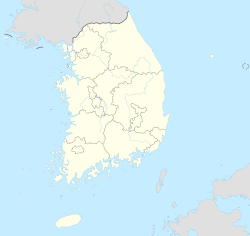Daegwallyeong-myeon (Korean: 대관령면; Hanja: 大關嶺面) is a myeon (township) in the county of Pyeongchang in the province of Gangwon-do, South Korea. It is located in the northeastern part of the county. The total area of Daegwallyeong-myeon is 221.63 square kilometers (85.57 sq mi),[2] and, as of 2008, the population was 6,162 people.[1] The myeon was named Doam-myeon (Korean: 도암면; Hanja: 道岩面) until 2007. Daegwallyeong-myeon is named after the important mountain pass of Daegwallyeong. It has the coldest average temperature in South Korea.[citation needed]
Daegwallyeong-myeon
대관령면 | |
|---|---|
Township | |
| Korean transcription(s) | |
| • Hangul | 대관령면 |
| • Hanja | 大關嶺面 |
| • Revised Romanization | Daegwallyeong-myeon |
| • McCune-Reischauer | Taegwallyŏng-myŏn |
| Coordinates: 37°40′00″N 128°42′00″E / 37.66667°N 128.70000°E | |
| Country | |
| Province | Gangwon-do |
| County | Pyeongchang |
| Administrative divisions | 21 ri |
| Area | |
• Total | 221.6 km2 (85.6 sq mi) |
| Elevation | 750 m (2,460 ft) |
| Population (2008)[1] | |
• Total | 6,162 |
| Time zone | UTC+9 (Korea Standard Time) |
Climate
edit| Climate data for Daegwallyeong, Pyeongchang (1991–2020 normals, extremes 1971–present) | |||||||||||||
|---|---|---|---|---|---|---|---|---|---|---|---|---|---|
| Month | Jan | Feb | Mar | Apr | May | Jun | Jul | Aug | Sep | Oct | Nov | Dec | Year |
| Record high °C (°F) | 9.3 (48.7) |
16.5 (61.7) |
20.5 (68.9) |
30.1 (86.2) |
31.0 (87.8) |
32.3 (90.1) |
32.9 (91.2) |
32.7 (90.9) |
29.0 (84.2) |
26.1 (79.0) |
21.5 (70.7) |
13.5 (56.3) |
32.9 (91.2) |
| Mean daily maximum °C (°F) | −1.8 (28.8) |
0.6 (33.1) |
5.5 (41.9) |
12.9 (55.2) |
18.4 (65.1) |
21.3 (70.3) |
23.4 (74.1) |
23.6 (74.5) |
19.4 (66.9) |
14.6 (58.3) |
7.5 (45.5) |
0.5 (32.9) |
12.2 (54.0) |
| Daily mean °C (°F) | −7.0 (19.4) |
−4.6 (23.7) |
0.4 (32.7) |
7.0 (44.6) |
12.5 (54.5) |
16.2 (61.2) |
19.6 (67.3) |
19.7 (67.5) |
14.6 (58.3) |
8.8 (47.8) |
2.3 (36.1) |
−4.5 (23.9) |
7.1 (44.8) |
| Mean daily minimum °C (°F) | −12.2 (10.0) |
−10.1 (13.8) |
−4.7 (23.5) |
1.2 (34.2) |
6.8 (44.2) |
11.6 (52.9) |
16.6 (61.9) |
16.5 (61.7) |
10.4 (50.7) |
3.5 (38.3) |
−2.6 (27.3) |
−9.4 (15.1) |
2.3 (36.1) |
| Record low °C (°F) | −28.9 (−20.0) |
−27.6 (−17.7) |
−23.0 (−9.4) |
−14.6 (5.7) |
−4.7 (23.5) |
−1.7 (28.9) |
4.4 (39.9) |
3.3 (37.9) |
−2.3 (27.9) |
−9.9 (14.2) |
−18.7 (−1.7) |
−24.7 (−12.5) |
−28.9 (−20.0) |
| Average precipitation mm (inches) | 53.1 (2.09) |
49.2 (1.94) |
72.6 (2.86) |
93.5 (3.68) |
108.2 (4.26) |
162.5 (6.40) |
336.3 (13.24) |
368.4 (14.50) |
249.6 (9.83) |
97.6 (3.84) |
69.4 (2.73) |
34.7 (1.37) |
1,695.1 (66.74) |
| Average precipitation days (≥ 0.1 mm) | 9.4 | 8.9 | 11.2 | 10.4 | 10.8 | 12.9 | 17.8 | 18.1 | 13.1 | 8.9 | 10.2 | 8.5 | 140.2 |
| Average snowy days | 13.0 | 11.8 | 12.0 | 3.3 | 0.2 | 0.0 | 0.0 | 0.0 | 0.0 | 0.8 | 5.2 | 10.9 | 57.2 |
| Average relative humidity (%) | 66.3 | 65.7 | 65.8 | 61.9 | 67.5 | 79.4 | 86.2 | 87.2 | 85.5 | 76.8 | 70.3 | 66.6 | 73.3 |
| Mean monthly sunshine hours | 199.3 | 193.5 | 210.9 | 223.1 | 237.2 | 192.4 | 143.0 | 138.2 | 149.6 | 196.2 | 177.2 | 193.3 | 2,253.9 |
| Percent possible sunshine | 64.4 | 60.8 | 54.6 | 57.4 | 52.1 | 40.7 | 30.8 | 31.0 | 38.6 | 55.5 | 57.8 | 64.3 | 49.3 |
| Source: Korea Meteorological Administration (snow and percent sunshine 1981–2010)[3][4][5] | |||||||||||||
Attractions
edit- Yongpyong Ski Resort: largest ski resort in South Korea, venue of 2018 Winter Olympics[6]
- Alpensia Resort: main venue of 2018 Winter Olympics
- Daegwallyeong Sheep Farm
- Pyeongchang Olympic Stadium: venue for the opening and closing ceremonies of the 2018 Winter Olympics.
References
edit- ^ a b Households and Population by Eup, Myeon and Dong (Resident Registration)
- ^ 평창군 [대관령면] 홈페이지 방문을 환영합니다.
- ^ "Climatological Normals of Korea (1991 ~ 2020)" (PDF) (in Korean). Korea Meteorological Administration. Archived from the original (PDF) on 29 January 2022. Retrieved 31 January 2022.
- ^ 순위값 - 구역별조회 (in Korean). Korea Meteorological Administration. Retrieved 10 October 2021.
- ^ "Climatological Normals of Korea" (PDF). Korea Meteorological Administration. 2011. p. 499 and 649. Archived from the original (PDF) on 7 December 2016. Retrieved 7 December 2016.
- ^ Yoon, Chul (27 December 2011). "7 best ski and snowboard resorts in Korea". CNN Go. Archived from the original on 2012-05-11. Retrieved 3 June 2012.
